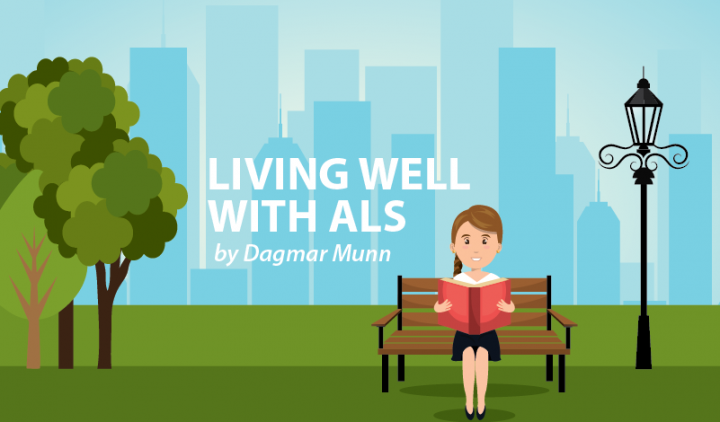I’m Not Surprised by ALS’ Link to Depression

Like many others in my ALS community, I try to keep up with ALS-related news and research. I’ll admit, though, that reading some scientific terminology makes my eyes glaze over. However, I do have a few favorite topics, including exercise, quality of life, and emotional well-being. Recently, I came across a news item that made me sit up and take notice: It was about how high levels of apathy felt by ALS patients create a burden for their caregivers.
I don’t disagree with the premise and am not surprised by the findings. What pushed my buttons was the realization that medical experts are still trying to figure out if having ALS causes patients to feel negative emotions.
ALS and depression?
Allow me an eye roll here. Yes, indeed, we ALS patients do experience negative emotions. Who wouldn’t feel angst at a diagnosis of a disease that has no cure and a prognosis of two to five years? To paraphrase a reader’s comment, we don’t do a stand-up comedy routine about the experience!
Join our ALS forums: an online community especially for patients with Amyotrophic Lateral Sclerosis.
What irked me was that this study was one more in a long line of variations on a theme, published over and over. Following are a few examples:
One study published in the journal Neurology in 2005 examined the prevalence of depression in late-stage ALS and sought to “determine whether depression increases as death approaches.”
Then, 10 years later, another study looked at a “possible association between anxiety-depressive disorders” in those with ALS.
A year later, in 2016, Swedish researchers found a higher risk of clinical diagnosis of depression, both immediately before and after being diagnosed with ALS.
When I think of all the walkathons, bake sales, and fundraising events we hold to support ongoing research only to have those dollars spent on duplicate studies, it makes me want to ask, “Can we please get a refund?”
There is good news
Information to help ALS patients deal with anxiety, depression, and apathy is available and studies are examining various strategies to help us to remain positive.
- I follow Francesco Pagnini, PhD, who has published many studies focused on improving ALS patients’ quality of life.
- My fellow ALS News Today columnist Rachel Doboga shares an excellent three-step treatment plan for ALS-related depression.
- Several of my columns discuss feeling down and out and how to find a more positive perspective. Two examples are, “The ALS Game Board of Life” and “Are You Stuck in the ALS Waiting Room?”
Let’s improve our quality of life and learn how to live well while living with ALS.
***
Note: ALS News Today is strictly a news and information website about the disease. It does not provide medical advice, diagnosis, or treatment. This content is not intended to be a substitute for professional medical advice, diagnosis, or treatment. Always seek the advice of your physician or other qualified health provider with any questions you may have regarding a medical condition. Never disregard professional medical advice or delay in seeking it because of something you have read on this website. The opinions expressed in this column are not those of ALS News Today or its parent company, Bionews Services, and are intended to spark discussion about issues pertaining to ALS.








jan berkhey
ofcource ALS patients are depressed, They have an horrible desease. Stemcells can cheer them up, it,s a proven treatment {nurown}, but they are slow, very slow in giving the patients the treatment! How many must die before thes stemcells are available for them! Give them the chance!!!!!
Dagmar Munn
Yes Jan, too many studies and too much money is spent trying to prove what "we" pALS already know: being diagnosed with and living with ALS make us feel depressed. However, I question your statement that stem cells "can cheer them up." Stem cell therapy has no direct effect on emotions. I believe that cognitive behavior therapy needs to be offered to all pALS in addition to new emerging treatments.
John Koten
I respect where the author is coming from, but this article doesn't reflect much understanding of the meaning of the words "depression" and "anxiety", at least not as they are used by mental health professionals. I also think that, if anything, there should be more research into the psychology of ALS. It is, of course, a huge quality of life issue for pALs and their families as they sort out new priorities and relationships in response to the disease. Even more important, though, are the many unanswered questions about the role of the mind's impact on the physical brain. Awhile back, some researchers from the Cleveland Clinic presented a paper in Germany. I don't remember the exact title, but it was something like: Why are ALS patients all so nice? This is a disputed subject--for good reason because we simply don't know enough about it yet.
Dagmar Munn
John - - actually we are in agreement. I too believe more should be done in the area of the psychology of ALS. I am objecting to the researchers that seem to be surprised and need to prove (over and over) that ALS causes negative emotions - - leading to clinical depression. They all conclude "more investigation is needed."
Receiving a diagnosis of ALS should in my opinion be treated as an "acute traumatic event." Cognitive behavior therapy (emphasis on PTSD) should be routinely prescribed to all patients. As it is now, we are offered much in the way of adaptive equipment but left on our own to deal with our own post-traumatic-stress; which many cannot successfully do.
John Koten
In that case......we do agree.
Per
Om du bara tilläts få assisterar självmord, skulle du känna mindre depretion. Då skulle du i alla fall veta att du kan dö när du vill. Det skulle förhindra depretion.
Nick
Thank you for this article Dagmar Munn.
I agree %100 with everything you talked about in the article.
@John
Your missing the point completely, if any treatment including NurOwn would slow down the progression of this disease I would be the Happiest Man On Earth!! You fix people with a death sentence of a disease and their mental, behavior, emotional state would improve across the board. After my diagnosis I became depressed, sad, emotional thinking how short my life would be after the diagnosis. It's hard to stay positive when you constantly lose something, more disabled all the time, you can't talk, walk, eat, breath,kiss the wife, play with the children.
Margaret Claffey
Please no more studies on depression and anxiety. It occurs in life whether you are ill with a serious disease or just living a non-medical illness. FIND A CAUSE -FIND A CURE.
David Buschhorn
There are some types of studies I would never fund. This is one. Who would? I think it's the kind of thing a professor does to maintain his/her position at a school. You have to publish so what do you do if you can't think of anything to do?
"Does the guarantee of dying horribly (soonish) make people anxious?" If you completely made up the data, I can guarantee no one will ever know because no one cares to even read it.
[facepalm]
Another thing that won't get a penny from me is anything that says they want to "raise awareness" about a disease like breast cancer.
Is this some kind of joke? Are there any girls over the age of 8 who don't know what breast cancer is? Any teens who don't know how to do a self exam? I'm a BOY and I know how to do one that's how little we need to raise awareness.
Raise awareness? Mission accomplished.
Please put all the "raise awareness" money into research for a cure.
Dagmar Munn
I agree with you David.
Somehow, somewhere, we pALS have been cut out of the selection process of what topics should be researched.